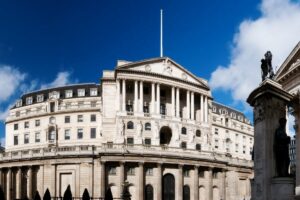By Sam Liddle, Director at Church House Investment Management
It looks like the worst may now be behind us as far as the coronavirus pandemic is concerned, with countries lifting restrictions worldwide as hospitalisation rates fall.[1]
This alone, however, does not mean we are out of the woods yet. With bond yields rising rapidly, equity markets volatile, inflation on the move, geo-political risks and energy prices soaring, we remain cautious.
With all this uncertainty, much maligned absolute return funds, with their ability to invest across assets, might just be the haven investors are seeking right now. They do, of course, have to choose carefully – not all absolute returns funds are created equal – and some might be more risk-on than others.
The cautious approach we are taking in our own Tenax Absolute Return Strategies Fund, is reducing exposure to equities and convertibles while adding significantly to near-cash assets, which now make up 40% of the whole portfolio.
This by no means suggests an absence of opportunities out there–in fact, we see many pockets of value across equity markets right now. Instead, it reflects our belief that market volatility will continue to be elevated for some time, and that we must shield ourselves from this as part of our absolute return mandate.
There are 5 key reasons driving our stance right now.
1) Rising inflation
“Transitory” was the buzzword used by central bank officials to describe elevated levels of inflation last year.[2]
We didn’t believe this at the time given the extreme QE measures adopted by central banks. And we certainly don’t believe it now that inflation is sitting at multi-decade highs in many countries with negative real rates reaching new extremes.[3][4][5]
Monetary policy is, of course, now tightening globally in a bid to combat this. But the reality is, these measures should have begun earlier, and will not address the factors driving elevated inflation overnight.
As long as inflation continues to run high, it runs the risk of reducing short-term revenues and profits for many companies and ultimately curbing economic growth.
2) Central bank policy
The Fed has signalled a rate hike in March, with analysts forecasting a further two or more increases by the end of December.[6][7] The Bank of England, meanwhile, recently made its first consecutive interest rate hike since 2004, increasing by a quarter point to 0.5%.[8]
Whilst designed to curb inflation these hikes are also a step on the road to normality. Normality, after all, is not keeping rates at emergency levels and flooding the market with unnecessary liquidity.
Our primary concern, however, is that rates rise too quickly causing borrowing to become too expensive if the underlying economy is not adequately robust. This could choke any economic recovery or even cause a recession.
3) Global politics
Uncertainty around Boris Johnson’s future as PM, given his alleged tussle with the truth,[9] looming mid-term elections in the US, where the Democrats face an increasingly slim chance of being able to cling onto control of the lower chamber,[10] and the increasing uneasiness surrounding international policy worldwide are all potential headwinds right now.
These, on top of the simmering fears around a Russian invasion of Ukraine, which looks set to prompt a widescale response from the US and Europe.[11] But beyond this, relations between the US and China, as well as North Korea and much of the rest of the world, continue to cause concern.[12][13]
However these issues pan out, and some may have greater ramifications than others, one thing’s for sure: they create market uncertainty.
4) Valuations
Last year we saw historically low bond yields coupled with unprecedented amounts of fiscal stimulus drive investors into riskier assets. Ultimately, some equity valuations, particularly in the US, soared to unsustainable levels.
We’ve seen some of the ‘froth’ come off the top (you only need to look at the performance of the FTSE 350 and the S&P 500 so far this year),[14][15] but believe equity valuations in the non-profitable, long duration growth stocks remain vulnerable to further increases in interest rates.
Moving forward, we expect to see an ongoing scaling back as interest rates rise. The rising cost of capital is likely to cut into the earnings of many companies and influence the net income reported on their next financial statements. But alongside this, as the “risk-free” rate becomes increasingly attractive, we expect investors to be less drawn to risk.
5) Oil prices
Few know where the oil price will head next. But what we do know is that it can majorly impact economies and, as such, should always be considered.
Although many OPEC+ countries claim to be increasing production, we believe that they do not necessarily have the capacity to do so in reality. After all, there has been little investment into new projects over recent years, with the financing available to large oil explorers and producers being rather tight.
This, of course, is partly driven by the rapid adoption of ESG principles and the ongoing switch to renewable resources and in practice, this lack of supply could set the scene for rising oil prices over the short-term as demand continues to grow after last year’s recovery.
As absolute return managers, top of our mandate will always be managing risk, not paying more than good value for assets, and not being afraid to hold cash when you can’t find assets at the right price. However, when areas of opportunity in riskier assets do arise, we will always consider an allocation if the surrounding economic conditions are adequately robust.
As it stands, we believe that the five factors above could all be a source of considerable volatility for some time. And as such, we believe that our positioning is adequately cautious for the time being.
[1] https://www.theguardian.com/world/2022/jan/23/covid-uk-over-worst-says-prof-neil-ferguson
[2] https://www.ft.com/content/62ef08f8-107e-4e80-b972-f624d7e1836e
[3] https://www.theguardian.com/business/2022/jan/19/uk-inflation-hits-near-three-decade-high-rising-to-54
[4] https://www.dw.com/en/us-inflation-hits-highest-rate-in-four-decades/a-60402688
[5] https://www.ft.com/content/c99e31e5-cb71-4fb7-9759-8bec058ed2c6
[6] https://www.reuters.com/business/fed-raise-rates-three-times-this-year-tame-unruly-inflation-2022-01-20/
[7] https://www.reuters.com/business/finance/inflation-fighting-fed-likely-flag-march-interest-rate-hike-2022-01-26/
[8] https://www.marketwatch.com/story/bank-of-england-makes-consecutive-interest-rate-hikes-for-first-time-since-2004-11643889865
[9] https://www.bbc.co.uk/news/uk-politics-60268378
[10] https://www.ft.com/content/2904563a-77b6-4a7a-ba9b-36f14b33ca8d
[11] https://news.sky.com/story/ukraine-russia-tensions-moscows-plans-ruined-after-us-and-britain-call-out-possible-invasion-12532256
[12] https://www.scmp.com/news/china/diplomacy/article/3165583/china-and-us-high-risk-stumbling-conflict-over-military
[13] https://www.ft.com/content/e50ceab9-6203-4af5-ba1b-18a304603728
[14] https://www.marketwatch.com/investing/index/nmx?countrycode=uk
[15] https://www.marketwatch.com/investing/index/spx

















